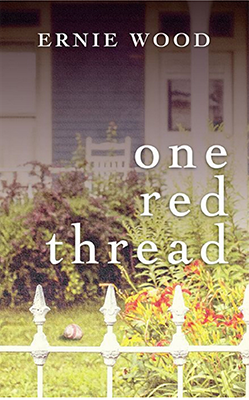 Michelle Newby is contributing editor at Lone Star Literary Life, reviewer for Foreword Reviews, freelance writer, member of the National Book Critics Circle, and blogger at www.TexasBookLover.com. Her reviews appear or are forthcoming in Pleiades Magazine, Rain Taxi, World Literature Today, South85 Journal, The Review Review, Concho River Review, Monkeybicycle, Mosaic Literary Magazine, Atticus Review, and The Collagist.
Michelle Newby is contributing editor at Lone Star Literary Life, reviewer for Foreword Reviews, freelance writer, member of the National Book Critics Circle, and blogger at www.TexasBookLover.com. Her reviews appear or are forthcoming in Pleiades Magazine, Rain Taxi, World Literature Today, South85 Journal, The Review Review, Concho River Review, Monkeybicycle, Mosaic Literary Magazine, Atticus Review, and The Collagist.
Lone Star Book Reviews
of Texas books appear weekly
at LoneStarLiterary.com
A native of North Carolina, author Ernie Wood received his AB in English literature from Hamilton College in New York, returned to his home state to work in newspaper and magazine journalism, and arrived in Austin in 1984 as a writer/editor for Southern Living magazine. Over a long career, he has been an award-winning writer of non-fiction books, documentary film scripts, advertising and journalism, which he also has taught at Austin Community College. Since the early 1990s has been a writer and manager of writers at a number of Austin advertising agencies and high-tech companies. One Red Thread is his first novel.
Tyrus Books
978-1-4405-8273-8, hardcover, 336 pgs., $24.99
May 2014
If you could go back in time, would you? Would you change events if it were possible to do so? Intervene to prevent a tragedy? Should you? Courage, noble sacrifice or hubris? How would you determine which specific link in the chain to alter, which thread to pull to alter the pattern without the whole tapestry unraveling? Is it even healthy for us to understand “too well” the relationships between those threads? I am mixing my metaphors. Remember the Butterfly Effect. The perfectly chosen epigraph to Part I of One Red Thread is from Ecclesiastes 3:15 — “Whatever is has already been, and what will be has been before.”
One Red Thread, a handsome book, is Austin writer and journalist Ernie Wood’s ambitious and accomplished first novel, taking on no less than time and space as well as history and the slippery nature of truth. Eddy McBride is a fortysomething architect much given to introspection and obsessive observation. He calls his defining habit “wool-gathering.” I call it navel-gazing that leads to analysis paralysis. “I can’t resist trying to make sense of how the world works. Find some meaning. And I can’t keep my sticky fingers out of the trouble that my searching sometimes brings. Unintended consequences.” The mysterious appearance on his front porch of Walter Lee, the elderly yard man who used to work for the McBride family, and the unsettling homecoming of Libby, a childhood friend, set the stage for a tragic and interwoven family history to come alive once more.
The main characters of One Red Thread are complex while leaving room for development — or regression as the case may be. There are times when you will doubt the reliability of each of the narrators (“These may have been real events, real memories, or real made-up stories.”); however, their various motivations seem genuine. Their distinct voices provide multiple first-person narratives, vividly presenting their divergent experiences and interpretations of, and reactions to, the same events in this intricately plotted and fast-paced story.
One Red Thread is a hybrid of mystery, horror, and the metaphysical that had me thinking Stephen King, Anne Rice’s The Witching Hour, “The Twilight Zone,” and Ray Bradbury’s Something Wicked This Way Comes. Seriously. Wood hooked me in the prologue and never lost me. He has created a challenging novel of psychological suspense with an atmosphere of pervasive foreboding. The sense of acute disturbance is all the more powerful because it remains nebulous almost until the end. The ending is satisfying in explanation with just the correct amount of tease and creeping unease.
Remember your Faulkner. “The past is never dead. It’s not even past.”
* * * * *


